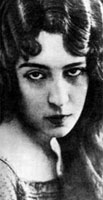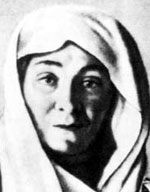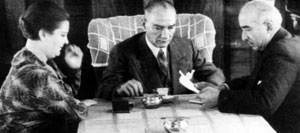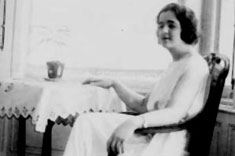
Search the Republic of Rumi |
|
DAWN The Review, September 2001 Women in the life of Ataturk
Mustafa Kemal had a strained relationship with most women who entered his life. His mother, Zubeyde, wanted him to become a religious scholar, and it is ironical that he became the person who eventually uprooted the centuries-old privileges of the religious elite in the entire history of Turkey. For a brief time in his youth he hated his mother, but later they were reconciled and he never stopped loving her again. She was a traditional oriental woman – weak, fragile and feminine but inexhaustible in her power of endurance. Possibly, Mustafa Kemal inherited her power of endurance, and her will to survive. Also, it seems likely that in his early confrontations with her mother the boy also learnt how to resist emotional blackmails of all kinds. He later used this ability to block out even his own emotions if he thought they could get in the way of what he wanted. Fikriye was a distant relative of Zubeyde's second husband. She became enamored with the young soldier and remained his "companion" for many years. Mustafa Kemal, however, packed her off without second thoughts once he was fed up of her company. Upon learning the news of Mustafa Kemal's marriage with Latife, a feminist, Fikriye rushed back home where she was stopped from seeing the great leader on his own orders. She committed suicide. The over-efficient police went overboard in clearing up her residence of all suspect material and this gave an opportunity to the family of Fikriye Khanum to accuse Mustafa Kemal of assassinating her. However, this accusation seems very ill founded. Latife, the only woman who inspired Mustafa Kemal to get married, was a feminist in her own age. The relationship turned bitter once the honeymoon was over. Although Mustafa Kemal was an ardent advocate of equality between the sexes and introduced many reforms to liberate the women of his country (Turkey was among the earliest states to grant women the right to vote), in his personal life Mustafa Kemal found it very difficult to cut himself down to the role of a husband. The marriage ended in a quick divorce. Towards the end of his life, Mustafa Kemal began adopting daughters. One of them, Sabiha Gokcen, was tested for her loyalty to her "father" when she was given a revolver and asked to shoot herself in the head. She complied, but the firearm wasn't loaded. She was then chosen to become a military pilot. She remained fanatically devoted to Ataturk to the end of her life. Ironically, the book that introduced Ataturk as a hero for all the world outside Turkey, also accused him of many ignoble vices. This was Grey Wolf, written by H. C. Armstrong and published in 1932. Not surprisingly, the book was immediately banned by Ataturk and the sanction wasn't lifted until the 1990's. However, it is said that Ataturk got it translated for his personal benefit and after listening to the entire translation, declared: "That fellow has made too little of our pleasures. Let me complete the account, and then the book will be allowed and everyone able to read it." On other occasions he made little effort to conceal what would be seen as his ignoble activities in the conservative Turkish society. On one occasion when he was in a boat with his drinking companions and happened to pass upon some innocent citizens, he lifted his glass to them and yelled: "This is liquor. This is what we drink." Indeed, Ataturk was a man of many dimensions but his rare virtue was his ability to keep the personal separate from the political. His own temperament about women didn't stop him from getting them a respectable place in the society.
| Indeed, Ataturk was a man of many dimensions but his rare virtue was his ability to keep the personal separate from the political.
|
|||||||||||



